Technology Quotes
Most popular technology quotes

Science in the service of humanity is technology, but lack of wisdom may make the service harmful.

One machine can do the work of fifty ordinary men. No machine can do the work of one extraordinary man.

The next digital literacy won't be about the nuts and bolts of how to use the web or a mobile phone, but how to set boundaries about when we let them encroach on our downtime.
![[Social] networks, search engines and e-commerce sites are conceptually designed to reduce our concerns about privacy. The technologies themselves aren't passive. "These technologies are as neutral as guns", says Jim Adler. - Aleks Krotoski quote.](/img/q/51/1151A-social-networks-search-engines-and-e-commerce-sites-are-conceptually-aleks-krotoski.png)
[Social] networks, search engines and e-commerce sites are conceptually designed to reduce our concerns about privacy. The technologies themselves aren't passive. "These technologies are as neutral as guns", says Jim Adler.
![There are human value judgements in each of [Google's] core components. Someone at some point had to make a decision about them in order to program them in. And this is what we should be aware of: Google doesn't deliver information that's independent. It is a cyborg: part machine, part human. It filters our problems through a technological system that is, at its most basic level, subjective. - Aleks Krotoski quote.](/img/q/52/1152A-there-are-human-value-judgements-in-each-googles-core-components-aleks-krotoski.png)
There are human value judgements in each of [Google's] core components. Someone at some point had to make a decision about them in order to program them in. And this is what we should be aware of: Google doesn't deliver information that's independent. It is a cyborg: part machine, part human. It filters our problems through a technological system that is, at its most basic level, subjective.
![[The importance Google places] on the number of links to a site stems from the philosophy that the crowd is always wise. Sure, it can be. But groupthink can also lead to dangerous booms and busts, like the South Sea Bubble, Tulip Mania, or the recent US mortgage crisis. As long ago as 1841, the author Charles MacKay worried about the "madness of crowds". - Aleks Krotoski quote.](/img/q/53/1153A-the-importance-google-places-on-the-number-links-site-stems-aleks-krotoski.png)
[The importance Google places] on the number of links to a site stems from the philosophy that the crowd is always wise. Sure, it can be. But groupthink can also lead to dangerous booms and busts, like the South Sea Bubble, Tulip Mania, or the recent US mortgage crisis. As long ago as 1841, the author Charles MacKay worried about the "madness of crowds".
Technology is neither good nor bad; nor is it neutral.
Invention is the mother of necessity.
Technology comes in packages, big and small.
Although technology might be a prime element in many public issues, nontechnical factors take precedence in technology-policy decisions.
All history is relevant, but the history of technology is the most relevant.
Technology is a very human activity - and so is the history of technology.

A good way to invent the future is to predict it. So I predicted Utopia, hoping to give Liberty a running start before the laws of Moore and Metcalfe delivered up what Ed Snowden now correctly calls 'turn-key totalitarianism'.

Humanity's fundamental weakness is to think we can save ourselves by getting aboard our own design with controls in hand.
To paraphrase the very quotable Silicon Valley venture capitalist Marc Andreessen, in the future there will be two types of jobs: people who tell computers what to do, and people who are told by computers what to do.
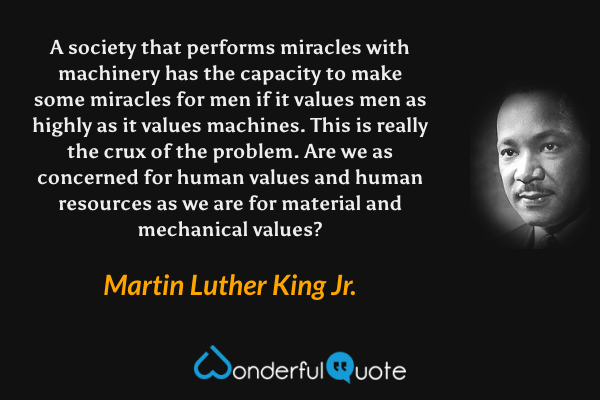
A society that performs miracles with machinery has the capacity to make some miracles for men if it values men as highly as it values machines. This is really the crux of the problem. Are we as concerned for human values and human resources as we are for material and mechanical values?

The real problem is not whether machines think but whether men do.

Lo! Men have become the tools of their tools.

Technological progress has merely provided us with more efficient means for going backwards.

Any sufficiently advanced technology is indistinguishable from magic.

Concerns for man and his fate must always form the chief interest of all technical endeavors. Never forget this in the midst of your diagrams and equations.
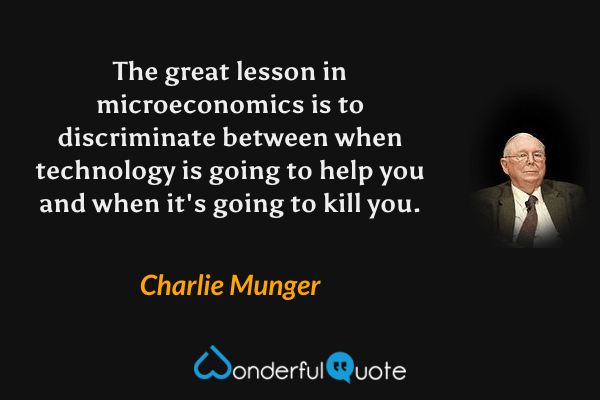
The great lesson in microeconomics is to discriminate between when technology is going to help you and when it's going to kill you.
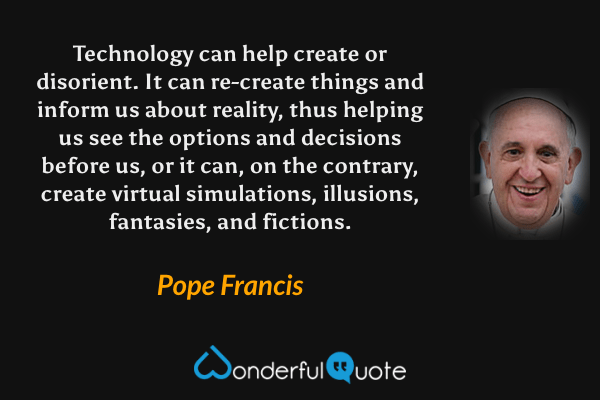
Technology can help create or disorient. It can re-create things and inform us about reality, thus helping us see the options and decisions before us, or it can, on the contrary, create virtual simulations, illusions, fantasies, and fictions.
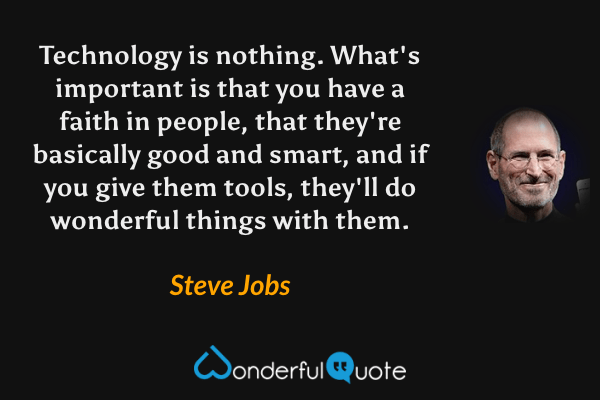
Technology is nothing. What's important is that you have a faith in people, that they're basically good and smart, and if you give them tools, they'll do wonderful things with them.
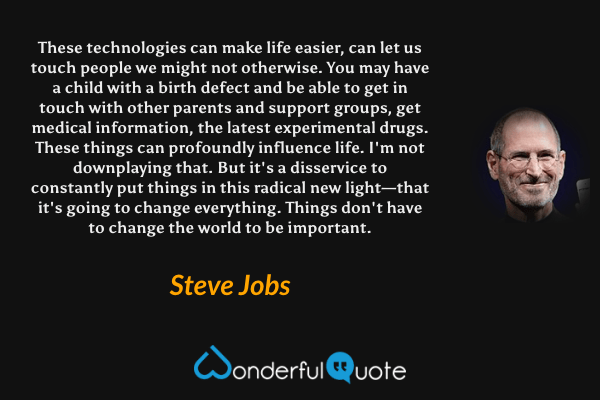
These technologies can make life easier, can let us touch people we might not otherwise. You may have a child with a birth defect and be able to get in touch with other parents and support groups, get medical information, the latest experimental drugs. These things can profoundly influence life. I'm not downplaying that. But it's a disservice to constantly put things in this radical new light—that it's going to change everything. Things don't have to change the world to be important.
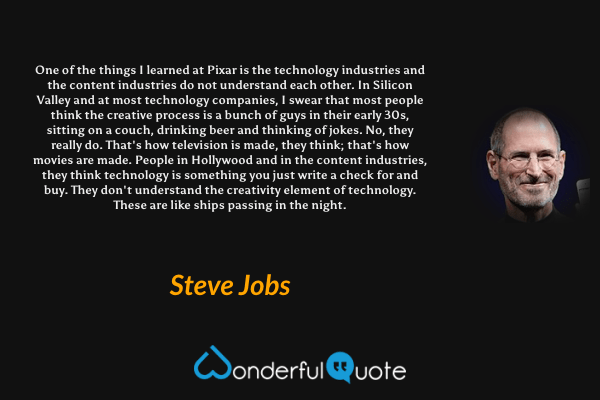
One of the things I learned at Pixar is the technology industries and the content industries do not understand each other. In Silicon Valley and at most technology companies, I swear that most people think the creative process is a bunch of guys in their early 30s, sitting on a couch, drinking beer and thinking of jokes. No, they really do. That's how television is made, they think; that's how movies are made. People in Hollywood and in the content industries, they think technology is something you just write a check for and buy. They don't understand the creativity element of technology. These are like ships passing in the night.
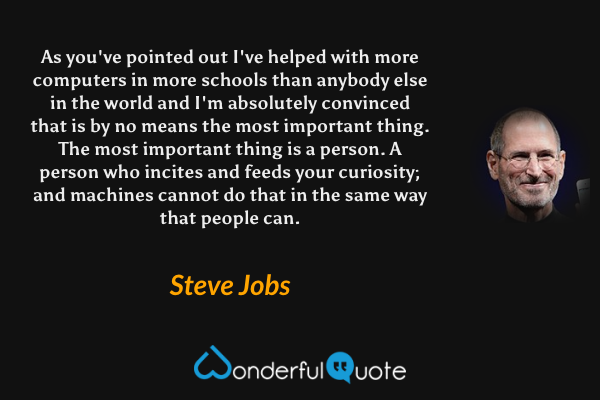
As you've pointed out I've helped with more computers in more schools than anybody else in the world and I'm absolutely convinced that is by no means the most important thing. The most important thing is a person. A person who incites and feeds your curiosity; and machines cannot do that in the same way that people can.
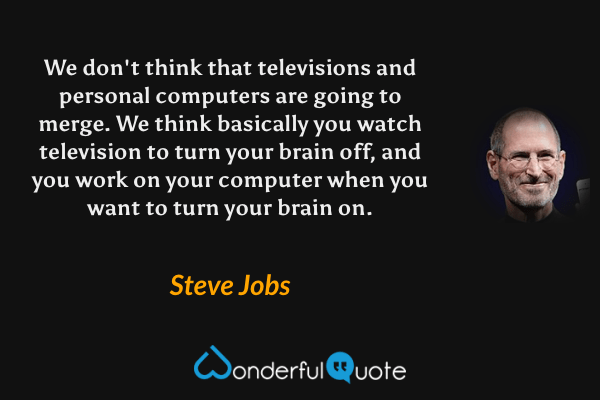
We don't think that televisions and personal computers are going to merge. We think basically you watch television to turn your brain off, and you work on your computer when you want to turn your brain on.
![[Technology] doesn't change the world. It really doesn't. Technologies can make it easier, can let us touch people we might not otherwise. But it's a disservice to constantly put things in a radical new light, that it's going to change everything. Things don't have to change the world to be important. - Steve Jobs quote.](/img/q/88/15688A-technology-doesnt-change-the-world-it-really-doesnt-technologies-can-steve-jobs.png)
[Technology] doesn't change the world. It really doesn't. Technologies can make it easier, can let us touch people we might not otherwise. But it's a disservice to constantly put things in a radical new light, that it's going to change everything. Things don't have to change the world to be important.
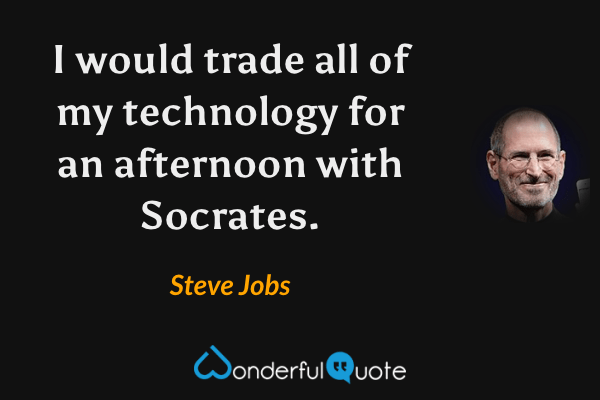
I would trade all of my technology for an afternoon with Socrates.

Our ability to create has outreached our ability to use wisely the products of our invention.
Men are going to have to learn to be managers in a world where the organization will come close to consisting of all chiefs and one Indian. The Indian, of course, is the computer.

The real danger is not that computers will begin to think like men, but that men will begin to think like computers.

Remember, nothing that's good works by itself just to please you. You've got to make the damn thing work.

The drive toward complex technical achievement offers a clue to why the U.S. is good at space gadgetry and bad at slum problems.

You on the cutting edge of technology have already made yesterday's impossibilities the commonplace realities of today.
Technology... is a queer thing. It brings you great gifts with one hand, and it stabs you in the back with the other.
Big machines are the awe-inspiring cathedrals of the 20th century.
When Consumer Reports begins to describe the potential for dire calamity that lies behind most everyday activities, my hands tremble, my vision blurs, and I have to go lie quietly for a while.

The difference between machines and human beings is that human beings can be reproduced by unskilled labor.
A refrigerator runs by converting the dust behind it into a peculiar mutant, reptilian substance.

Technology is so much fun but we can drown in our technology. The fog of information can drive out knowledge.
Today even our clocks are not made of clockwork.
Ours is the age, that is proud of machines that think and suspicious of men who try to.
I'm not convinced that the world is in any worse shape than it ever was. It's just that in this age of almost instantaneous communication, we bear the weight of problems our forefathers only read about after they were solved.
ROAD SENSE God save us, now they're murdering another winding road, and another lovely countryside will take another load of pantechnicon and car and motorbike. They're busy making bigger roads, and better roads and more, so that people can discover even faster than before that everything is everywhere alike.

There is no monster more destructive than the inventive mind that has outstripped philosophy.

Today's science is tomorrow's technology.

Technology, like art, is a soaring exercise of the human imagination.
If we had a reliable way to label our toys good and bad, it would be easy to regulate technology wisely. But we can rarely see far enough ahead to know which road leads to damnation.
Shortly after the turn of the century, America marshalled her resources, contracted painfully, and gave birth to the New Technology. The father was a Corporation, and the New Technology grew up in the Corporate image.

Technology ... the knack of so arranging the world that we need not experience it.
The most important and urgent problems of the technology of today are no longer the satisfactions of the primary needs or of archetypal wishes, but the reparation of the evils and damages by the technology of yesterday.
The important thing to remember is that technology is not necessarily the same thing as civilization.
The acceleration of technological progress has created an urgent need for a counter ballast—for high-touch experience.

The shock of twentieth-century technology numbed our brains and we are just beginning to notice the spiritual and social debris that our technology has strewn about us.

We cannot get grace from gadgets. The dishes in the bakelite houses of the future may not break, but the heart can. A man may be as unhappy in the spun glass trousers of tomorrow as he is today in worsted ones.

Technology presumes there's just one right way to do things and there never is.

We live in a society exquisitely dependent on science and technology, in which hardly anyone knows anything about science and technology. This is a clear prescription for disaster.

Technology...is a queer thing. It brings you great gifts with one hand, and it stabs you in the back with the other.
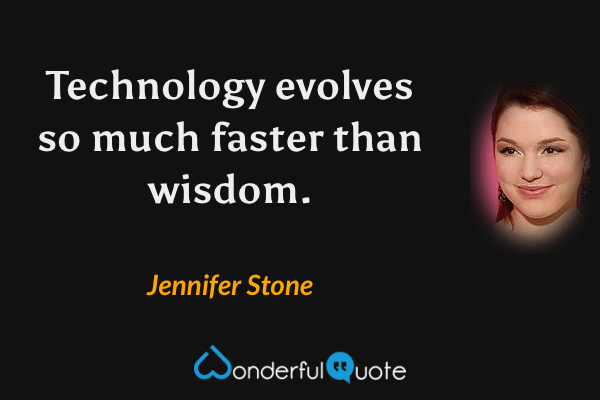
Technology evolves so much faster than wisdom.

That great, growling engine of change—technology.

Man cannot live by technology alone.

Technology: the invention, manufacture, and use of tools.
Technology doesn't just do things for us. It does things to us, changing not just what we do but who we are.
The most profound technologies are those that disappear. They weave themselves into the fabric of everyday life until they are indistinguishable from it.

If it keeps up, man will atrophy all his limbs but the push-button finger.

Men have become the tools of their tools.

It has become appallingly obvious that our technology has exceeded our humanity.
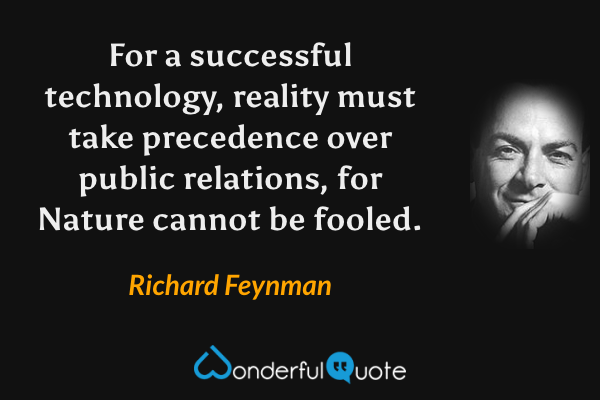
For a successful technology, reality must take precedence over public relations, for Nature cannot be fooled.
Soon silence will have passed into legend. Man has turned his back on silence. Day after day he invents machines and devices that increase noise and distract humanity from the essence of life, contemplation, meditation ... tooting, howling, screeching, booming, crashing, whistling, grinding, and trilling bolster his ego. His anxiety subsides. His inhuman void spreads monstrously like a gray vegetation.
Today's world is one in which the age-old risks of humankind—the drought, floods, communicable diseases—are less of a problem than ever before. They have been replaced by risks of humanity's own making—the unintended side-effects of beneficial technologies and the intended effects of the technologies of war. Society must hope that the world's ability to assess and manage risks will keep pace with its ability to create them.

Western society has accepted as unquestionable a technological imperative that is quite as arbitrary as the most primitive taboo: not merely the duty to foster invention and constantly to create technological novelties, but equally the duty to surrender to these novelties unconditionally, just because they are offered, without respect to their human consequences.

Reason and justice tell me there's more love for humanity in electricity and steam than in chastity and vegetarianism.
All of the biggest technological inventions created by man—the airplane, the automobile, the computer—says little about his intelligence, but speaks volumes about his laziness.

All of the books in the world contain no more information than is broadcast as video in a single large American city in a single year. Not all bits have equal value.
Building one space station for everyone was and is insane: we should have built a dozen.
Building technical systems involves a lot of hard work and specialized knowledge: languages and protocols, coding and debugging, testing and refactoring.

Civilization advances by extending the number of important operations which we can perform without thinking of them.
Do you realize if it weren't for Edison we'd be watching TV by candlelight?
For a list of all the ways technology has failed to improve the quality of life, please press three.

Humanity is acquiring all the right technology for all the wrong reasons.

I am sorry to say that there is too much point to the wisecrack that life is extinct on other planets because their scientists were more advanced than ours.

I think I should not go far wrong if I asserted that the amount of genuine leisure available in a society is generally in inverse proportion to the amount of labour-saving machinery it employs.
I'm struck by the insidious, computer-driven tendency to take things out of the domain of muscular activity and put them into the domain of mental activity. The transfer is not paying off. Sure, muscles are unreliable, but they represent several million years of accumulated finesse.
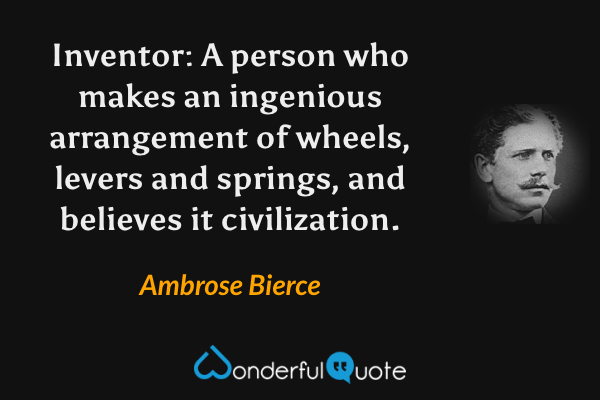
Inventor: A person who makes an ingenious arrangement of wheels, levers and springs, and believes it civilization.

Radio is a medium of entertainment which permits millions of people to listen to the same joke at the same time, and yet remain lonesome.

It is difficult not to wonder whether that combination of elements which produces a machine for labour does not create also a soul of sorts, a dull resentful metallic will, which can rebel at times.

It is questionable if all the mechanical inventions yet made have lightened the day's toil of any human being.
Man is a slow, sloppy and brilliant thinker; the machine is fast, accurate, and stupid.
Modern technology owes ecology an apology.

Never trust anything that can think for itself if you can't see where it keeps its brain.
Once upon a time we were just plain people. But that was before we began having relationships with mechanical systems. Get involved with a machine and sooner or later you are reduced to a factor.
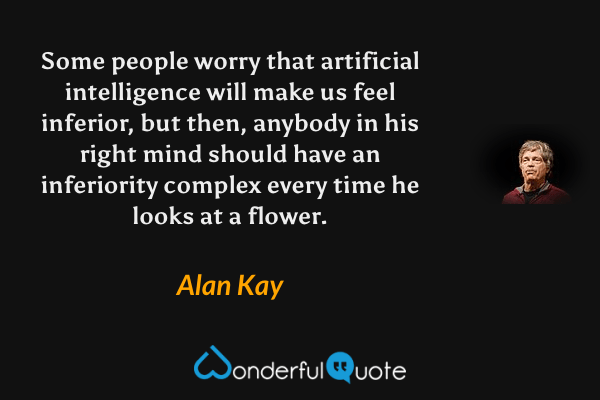
Some people worry that artificial intelligence will make us feel inferior, but then, anybody in his right mind should have an inferiority complex every time he looks at a flower.

Technology ... is a queer thing. It brings you great gifts with one hand, and it stabs you in the back with the other.

Technology... the knack of so arranging the world that we don't have to experience it.
The drive toward complex technical achievement offers a clue to why the US is good at space gadgetry and bad at slum problems.

The factory of the future will have only two employees, a man and a dog. The man will be there to feed the dog. The dog will be there to keep the man from touching the equipment.
The greatest task before civilization at present is to make machines what they ought to be, the slaves, instead of the masters of men.

The machine does not isolate man from the great problems of nature but plunges him more deeply into them.

The production of too many useful things results in too many useless people.
The system of nature, of which man is a part, tends to be self-balancing, self- adjusting, self-cleansing. Not so with technology.

This is perhaps the most beautiful time in human history; it is really pregnant with all kinds of creative possibilities made possible by science and technology which now constitute the slave of man—if man is not enslaved by it.

We are becoming the servants in thought, as in action, of the machine we have created to serve us.
We live in a society exquisitely dependent on science and technology, in which hardly anyone knows anything about science and technology.

We've arranged a civilization in which most crucial elements profoundly depend on science and technology. We have also arranged things so that almost no one understands science and technology. This is a prescription for disaster. We might get away with it for a while, but sooner or later this combustible mixture of ignorance and power is going to blow up in our faces.
What the country needs are a few labour-making inventions.
When a machine begins to run without human aid, it is time to scrap it— whether it be a factory or a government.

Where there is the necessary technical skill to move mountains, there is no need for the faith that moves mountains.

You cannot endow even the best machine with initiative; the jolliest steam-roller will not plant flowers.

Without even noticing, just as astronomy entered a golden age most people cut themselves off from the sky, a cosmic isolationism that ended only with the dawn of space exploration.

At the very moment that humans discovered the scale of the universe and found that their most unconstrained fancies were in fact dwarfed by the true dimensions of even the Milky Way Galaxy, they took steps that ensured that their descendants would be unable to see the stars at all.
At the heart of most immense, intractable, societal problems lie the hubris of science, the ubiquity of technology, the mythology of economics, and the corruption of commerce.
The zeal with which we are led to believe that technology will eventually save us from ecological, social, and political disaster would be laughable were its consequences less grim.


